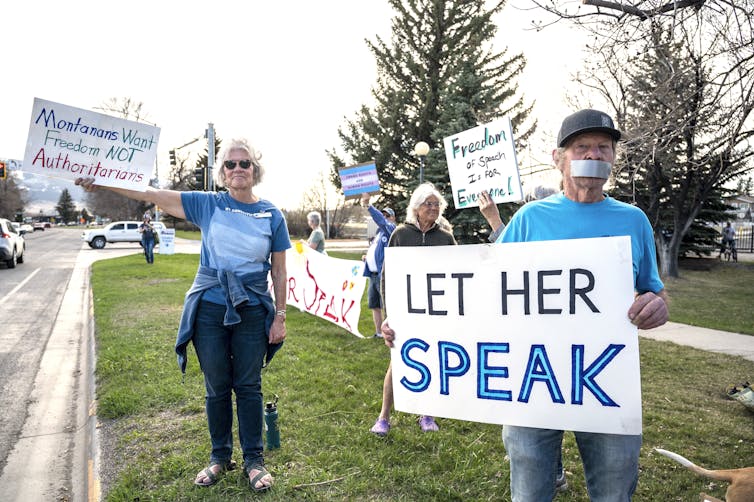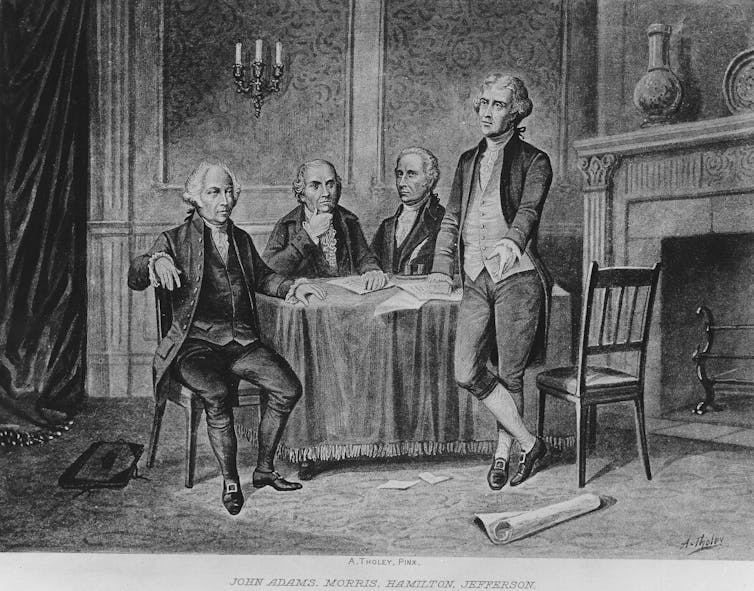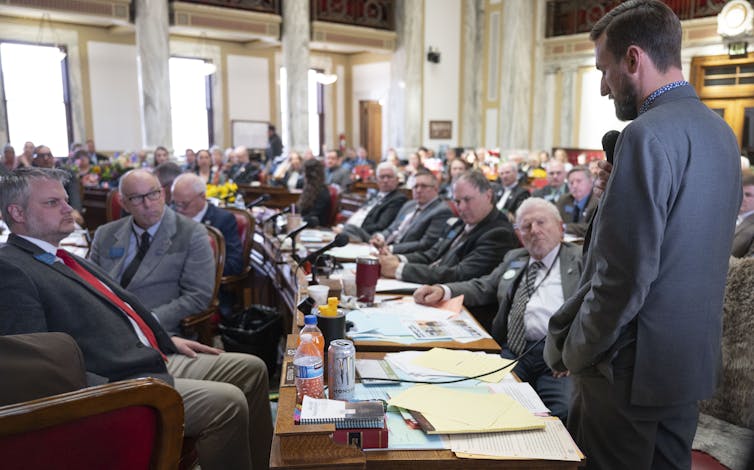This article is part of TPM Cafe, TPM’s home for opinion and news analysis. It was originally published at The Conversation.
A Montana District Court judge has rejected Democratic state Rep. Zooey Zephyr’s attempt to return to the House floor following Republican lawmakers’ moves that blocked her from entering or speaking in the House chamber at the end of April 2023.
Zephyr sued Republican leaders of the Montana House of Representatives for barring her from proceedings on the floor. The Montana judge, a former Democratic state legislator himself, ruled on May 2, 2023, that reinstating Zephyr was not within the court’s power and would “interfere with legislative authority.” The American Civil Liberties Union of Montana represented Zephyr and four of her constituents in the lawsuit.
The ACLU said the removal and silencing of Zephyr, the state’s first openly transgender lawmaker, violates democratic principles of freedom of expression and political participation.
It might also violate the spirit of legislative rules set by none other than Thomas Jefferson, one of the founders of this country, more than 200 years ago. Those rules were written to protect minority views, which the majority in power in the Montana House did not choose to do.
I am a political scientist focusing on American politics, minority politics and prejudice reduction. I have written and researched about the impact of prejudice in American politics as well as how public policy affects minorities.
It’s clear that rules and customs in U.S. politics and state legislatures have evolved since Jefferson first drafted a set of procedural rules. But previous standards of decorum appear now to be diminishing in state politics.
Zephyr’s punishment, as well as the recent expulsion of two Black legislators in Tennessee for speaking without being recognized and leading gun control protests, highlight a trend in which parliamentary rules are used to silence and expel minority lawmakers from legislatures.

What happened
Republicans leading the Montana House say Zephyr broke rules of decorum after she raised a microphone above her head as protesters chanted, “Let her speak,” in the House chamber on April 24, 2023.
House Speaker Matt Regier and other Republicans voted on April 26, 2023, to stop Zephyr from speaking on the House floor after the protest and after she refused to apologize for saying eight days earlier that lawmakers who restricted access to gender affirming care would see “blood on their hands.”.
With this vote, the Montana House of Representatives barred Zephyr from the House floor for the remainder of the session, which normally ends in May. This means that while Zephyr can vote remotely on measures, she cannot speak on the House floor. It also blocks her from other work areas in the legislative building.
Republicans have said they censured Zephyr because she incited protesters in the House chamber.
“The choice not to follow House rules is one Rep. Zephyr has made. The only person silencing Rep. Zephyr is Rep. Zephyr. The Montana House will not be bullied,” Regier wrote on Twitter.
Zephyr’s censure comes amid a wave of efforts nationwide to restrict access to gender-affirming health care. Lawmakers have introduced 400 anti-trans bills nationwide since January 2023.
Understanding rules of decorum
The U.S. House of Representatives and state legislatures have specific rules governing decorum, or how lawmakers should behave while in and outside of legislative sessions. These include rules allowing the House speaker or other political leaders to choose who can speak and for how long.
Legislatures, at both the state level and Congress, can choose to reprimand – or remove – members who breach the rules. In the U.S. House, members have been censured for sharing violent videos about harming colleagues and for engaging in sexual misconduct, among other things.
Legislative leaders have wide discretion about whether to allow elected officials to speak. Legislators have equally broad discretion over whether to censure or remove members who break these rules.
In Zephyr’s case, Montana House Speaker Regier, according to the legislature’s rules, did have the authority to bar Zephyr from speaking. This decision is drawn from the Montana House’s documented rules.
Yet, Zephyr’s censure was unprecedented in modern Montana politics, and similar breaches of decorum have gone unpunished there.
Preventing minority legislators from participating fully in legislative debates violates democratic principles of free debate and equal representation.
Using parliamentary rules to silence and censure lawmakers also violates the spirit of those rules, according to Jefferson.

These rules have a long history
The U.S. House and many state legislatures, including Montana’s, largely follow rules written by Jefferson and published in 1801.
Current Senate rules are also heavily influenced by Jefferson’s manual.
Jefferson wrote these rules during a tumultuous time in the nation’s history. He worried that the divisiveness of politics in his era might rip the young country apart.
His manual includes behavioral guidelines like, “No one is to disturb another person who is speaking by hissing, coughing, spitting, speaking or whispering to another.”
At the turn of the 19th century, the House and Senate were not governed by a set of distinct rules, and there was only limited guidance dictated by the Constitution. Jefferson worried that the lack of specific rules of procedure gave too much latitude to legislative leaders.
Codifying the rules, he surmised, would help to protect the minority. He saw the rules as “the only weapons by which the minority can defend themselves against” the abuses of the majority.

The censuring is a failure in political civility
Yet, these parliamentary procedures failed to protect the minority viewpoint when it came to Montana’s first transgender lawmaker.
I believe this is because of a breakdown in civility and a lack of empathy in American politics.
While Zephyr may have broken the Montana legislature’s rules of decorum with what she said or did, political scientists have recognized that democracy requires forbearance or restraint in the exercise of political power, which House leaders did not do in the face of Zephyr’s violation. When politicians exercise their authority without restraint, democracies break down.
Informal norms in American politics – such as civility toward all colleagues – tend to promote political cooperation and contribute to the functioning of a healthy democracy.
Democracy also performs better when opposing sides exercise compassion toward one another.
The failure to exercise mutual toleration and forbearance toward members of the opposing party only heightens divisions and degrades the country’s democracy. During such a polarizing time, I think it is more important than ever to exercise political restraint and compassion toward those unlike ourselves.
This article is republished from The Conversation under a Creative Commons license. Read the original article.






